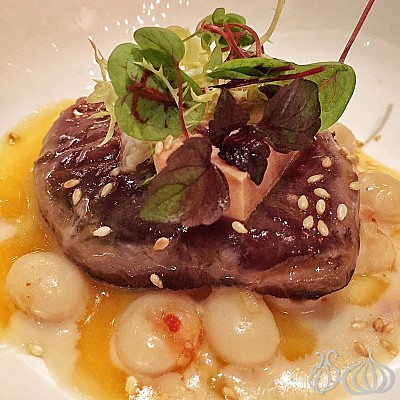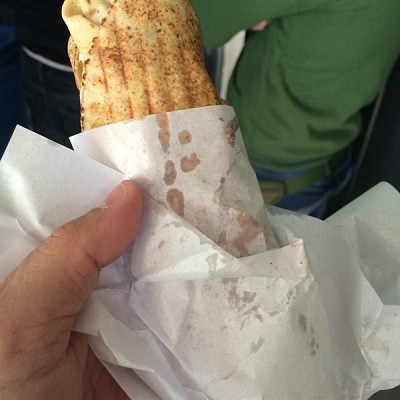Lebanon has a new beer, after years of waiting, 'Beirut' is a beer that will stop the monopoly of the brewing industry in our country. Prior to its launch, the Kassatly family, the giants behind brands like Freez and Buzz has been working on this beer for sometime now, coming up with a new blend that will take the country, and hopefully beyond, by storm.

I wanted to see, for myself, the efforts put into the bottles, those beautifully designed green bottles Lebanon has long been waiting for. I was invited to come, camera in hand, to look into every detail I wanted to know about Beirut beer. The project first came to light in July 2013 and it was decided to start building a state of the art factory next to Kassatly's freez production units. Nine months passed by quickly and Beirut's Beer factory was born in a hangar with a capacity of 200,000 hectoliters per year. Every item was imported from Europe while a team of German beer professionals spent a year to built the finest brewery Lebanon has ever seen. The floor, the tiles, the machinery, the computers... it’s a breathtaking factory and worth looking into.

Why Beirut, I ask? "Beirut for the name, Beirut for the city, Beirut because it represents everything, Beirut because we love our country." This is how Beirut beer was born. As you walk in, you'll notice the cleanliness of this stainless steel castle. Hundreds of meters of machinery, pumping like a heart with no employees walking around. To the right, the operating room, where technicians monitor every single detail of production from the complex machines sitting at the end of their fingers. Thousands of meters of stainless pipes, hundreds of taps, dozens of tanks, computers, boilers, the list goes on. You'll feel dizzy from trying to understand the details that surround you.

Some interesting details to know before continuing:
- Let's start at the floor. A floor that looks like a beehive, the tiles have specially been imported from Germany
- The water is cleaned using a reverse osmosis system obtaining a demineralized water which will guarantee the same taste and flavor throughout all batches
- Beirut Beer is a pilsner beer using pilsner water and pilsner malt
- The entire process is automated using state of the art technology
- Pale pilsner premium malt is imported from Soufflé, France and Viking, Sweden
- The factory contains 3 major water tanks. One containing the 0% oxygen pure water for production! The second contains cold water for cooling the machinery before starting production and the third contains hot water for brewing.

Mr. Nayef Kassatly, the man behind the bold plan, took me around the premises explaining every step of the process. All it takes is four simple ingredients: water, malt, hops and yeast. Four ingredients manipulated differently to produce a unique recipe for each brewery around the world. Some breweries add corn to the recipe.
- 1st step: Water is prepared, a special water with 0% oxygen. The malt is than added and both ingredients are boiled together
- 2nd step: Spent grain is removed
- 3rd step: The liquid is worked on at different temperatures to obtain the desired color, smell and concentration
- 4th step: Hops are added to the mix after accurate dosing. Hops are the bitter agent.

Every time we walked down one alley, another one popped up. As I thought the production process finished, we went on to discover the yeast area. In those tanks, yeast is fed so it lasts 8 to 10 generations before the process starts all over again.

Now things were starting to get interesting. The most important part is the fermentation. Twelve huge tanks, each 12 meters tall, have been imported directly from Germany to the Beirut seaport from where they traveled all the way up to Chtaura. In here, beer ferments at 12 degrees for 5 to 7 days for it to reach the alcohol levels required. Lagering time then follows, a process that needs up to 20 days where the beer is left at 1 degree to mature. This process transforms the beer from a good beer to a premium beer. Doing the math, each bottle needs 30 days to be produced. From the first process where the malt enters the water tank to reaching the filling and labeling line, 30 days would have passed.

"Today, the average beer consumption in Lebanon is 5 litres per person, per year. We hope to multiply this formula for the years to come. I think it's one of the lowest you’ll find, when a German drinks 80 liters per year, or a Czech 120 liters," Nayef continues. Now that the beer is ready, it is filtered, checked for CO2 levels and alcohol concentration before moving down the pipes to the bottling plant. In here, thousands of bottles and cans are cleaned then filled before going into the pasteurizer, a unique piece of machinery that can handle up to 30,000 bottles per hour.

While the bottles continued their way to the cleaning area, I grabbed one to taste what Beirut beer is about. Beirut beer blends the concept of a sophisticated beer and its strong bitterness with a pilsner, casual beer produced for daily consumption. Strong in flavor, light in body, just right in terms of alcohol level, I believe this beer has a bright future. I’d like to bring an important point to your attention. Almaza and Beirut are the only real options in Lebanon if you take the types of beer, the scale of production and final taste into account. 961 and Colonel both compete in another part of the market.

That said, let’s move onto Beirut beer itself. The bottle is beautifully designed with a background depicting an image of old Lebanese tiles, the type usually found in old homes in Beirut. The word “Beirut” is boldly expressed with a ‘T’ that has two dots on top, reflecting the “t” in the Arabic alphabet as well as a "B" with the two dots below the letter. On the bottle is written:
- Pilsener beer, the authentic recipe
- Committed to excellence
- Water, malted barley, hops
- 4,6% Alcohol
That's a quick comparison I encourage you to try for yourself: Beirut:
- Has a lighter color
- Offers a lighter taste and feels more watery
- It has a slight enjoyable bitter aftertaste
- 4.6% alcohol
- Less prominent aromas
- Interesting to drink, feeling more like a German beer
- Proposes three different sizes of glass bottles
Almaza:
- Almaza is darker in color
- 4.2% alcohol
- Has a nice taste but less aftertaste you expect from a beer
- No bitter aftertaste (you expect from a beer)
- It's more of a casual drink, that's smoother to drink but lacking body
- Great for the beach
- Contains an additional ingredient that is Corn (making the beer cheaper to produce but making it smoother to drink. It can sometimes give a bloating effect)
Almaza vs. Beirut: Two different beers with two different consistencies and two different tastes, each good for a different moment of pleasure. Now that I am satisfied knowing the details behind the process, I can assure you that Beirut beer hasn't been awaited for nothing. Some hard work is put inside each and every bottle. Taste it and give us your opinion.































































































































































